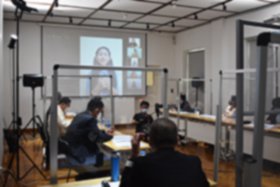Myanmar 2020
The Japan Foundation, Yangon
KONISHI Hiroaki
Hello, everyone. Mingalaba.
Last year (FY2020), I introduced the work of the Japanese-Language Specialists in the Japan Foundation, Yangon (hereinafter "JFYG") under the title of "The First Japanese-Language Specialist has Arrived." The situation since then has dramatically changed, and the shape of our duties has also dramatically changed. This report focuses on what happened in FY2020 and what changed.
To begin with, we made a "temporary evacuation" back to Japan for approximately five months from April to September 2020, which was due to the COVID-19 pandemic that spread worldwide. As of May 1, 2020, in Myanmar there were a cumulative total of 151 people who were sick and six people who had died, so, looking at it from the present, COVID-19 was not very widespread. However, at the end of March, the Myanmar Ministry of Education issued instructions to close all educational institutions nationwide, and all in-person lectures at the Yangon University of Foreign Languages (hereinafter "YUFL"), which is our workplace, were cancelled. Myanmar's school calendar starts the new school year in December, the first semester is until March, and the second semester is from June to September, so most educational institutions stopped studying at the end of the first semester.
Prior to COVID-19, YUFL held all lectures and meetings in-person, so there was no knowledge or experience about the concept of "teaching languages online." We decided to use Moodle, an e-learning platform, but first, all of the Japanese-language teachers had to start by learning how to use Moodle. Then, before teaching online, the teachers had to "learn how to teach online." April is the hottest season in Myanmar, and usually there is also the New Year and a fabulous water festival called Thingyan, so usually it is the most laid-back and fun season of the year, but 2020 was very different. The Thingyan water festival was cancelled nationwide in order to prevent the spread of COVID-19, and the teachers were struggling with how to do computer operations that they were not accustomed to.
During this time period, I used Zoom to give YUFL teachers three lectures on "How to teach the Japanese language online." I participated from Japan, but the teachers who participated were gathered in a single room at YUFL. The reason for this is that their internet connections at home are unstable, and, if they have a question, they can immediately ask a colleague. Everyone, including myself, was not accustomed to Zoom, and, even with the breakout room feature, some teachers often began talking with the people who were near them.
As of September 1, the cumulative number of infected people was 887 and there were six people that had died, a situation that was relatively calm, so the Japanese-Language Specialists who had temporarily evacuated to Japan, including myself, were dispatched again in sequence. However, courses for the second semester of the school year, which had originally been scheduled to begin in September, were postponed as per instructions from the Ministry of Education. It felt like they were considering the risks of in-person classes.
The teachers seemed to have a good grasp on how to use Moodle for lectures, how to keep learning records, how to score assignment, and how to use Zoom and Google for lectures, but, ultimately, the classes were not held online.
It was not only difficult for the teacher, but also a very difficult year for Japanese-language learners, with one example being the cancellation of both the July and December Japanese-Language Proficiency Tests (JLPT). However, on the other hand, being able to hold the 21st Japanese Speech Contest online for the first time was a great achievement. I hope you’ll check it out on JFYG's Facebook page!
https://www.facebook.com/JFYangon/video
Similarly, we were able to hold the "16th Japanese Literature Translation Contest" online. For the Junior Level contest alone, there were 184 online participants. This online learner incentive program was not just the first time for the participants to compete in this online competition, but it was also our first time to host it online. Although there were a variety of obstacles and problems, we thankfully were able to end up holding the contest and successfully completed it. In particular, it is extremely significant that holding the competition online made it possible for people to participate from outside of the two metropolitan areas of Yangon and Mandalay.
We also held the 12th "Myanmar Japanese-Language Teachers Training Seminar" online for the first time as a project for teachers, and it was a great success, with 175 applicants and 145 participants.
Through these efforts, we are steadily accumulating online experience, albeit little by little, amidst the COVID-19 pandemic.

Online Japanese speech contest with the COVID-19 measures
- What We Do Top
- Arts and Cultural Exchange [Culture]
- Japanese-Language Education Overseas [Language]
- Japanese-Language Education Overseas [Language] Top
- Learn Japanese-language
- Teach Japanese-language
- Take Japanese-Language Test
- Know about Japanese-language education abroad
- The Japanese-Language Institute, Urawa
- The Japanese-Language Institute, Kansai
- Japanese-Language Programs for Foreign Specified Skilled Worker Candidates
- Japanese Language Education for Japanese Children Resident Overseas and for the Descendants of Migrants
- Archives
- Japanese Studies and Global Partnerships [Dialogue]
- JF digital collection
- Other Programs / Programs to Commemorate Exchange Year
- Awards and Prizes
- Publications
